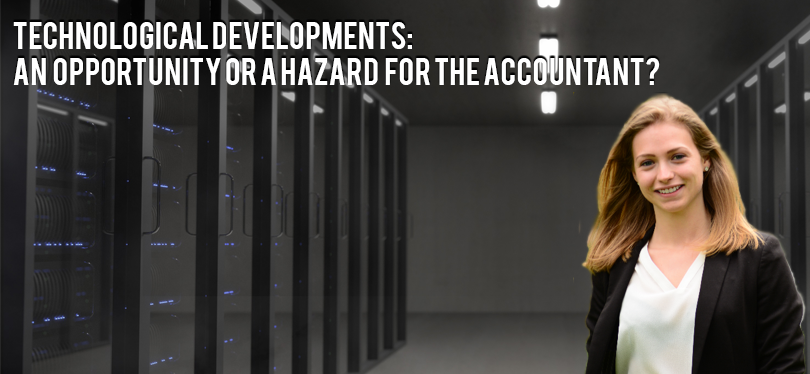“Technological developments will make the traditional accountant unnecessary.” One would hold on to his way of thinking and refuse to accept that things are changing. However, the technological changes are not to be denied.
Automation and robotization are being implemented increasingly and on a larger scale in the world of business. Big data and blockchain are examples of disruptive technologies that are relevant to accountancy. These developments are still in their infancy, but are likely to grow fast and become increasingly important and indispensable.
Revolution of the digital era
The development of society in technological means transform the way one communicates, makes use of products and utilizes and provides services. Big data is both collecting and storing unstructured data on a large scale. It is mainly used when the amount of data is too large to be maintained in regular databases. It offers companies a high level of accessibility to information that can be transformed to added value. Blockchain, originally the data structure behind Bitcoin, is a rather non-hackable transfer method of data and digital money. Many large companies are already evolving when it comes to digitization. For example, firms as Ernst & Young and Deloitte focus on providing information on opportunities and hazards of technology as well as their core tasks.
The end of the audit profession?
The use of automation, robotization and data analysis is cost-effective and leads to more effectiveness. It is therefore not incomprehensible that these business processes gain ground within financial positions, including those of the accountant. Administration is usually done automatically and the financial statements can be compiled with one press of the button. The core tasks of the accountant can be replaced; the role of the traditional accountant is increasingly fading to the background. And what about checking the accounts? The obligation that large companies and socially important organisations have for this ensures that this remains a task for the accountant himself. However, it will not take long before the continuous automation can take over. What’s left is checking whether the check has been executed properly. The expectation is that even this task can be taken over by computers. There is a chance that computers become more intelligent than people, which makes human intervention unnecessary. The audit profession seems to be lost in the growth of technology.
Transformation
A dead-end future? Not necessarily. It should be clear that in time the traditional accountant cannot remain traditional. Nevertheless, innovation would not be innovative if it does not involve opportunities. Despite that the core tasks of the accountant will be taken over by computers, does it not necessarily mean the end for the audit profession. It only means that the profession has to be transformed. Companies can use big data by deploying it for checking accounts, detecting fraud and benchmarking; comparing customer performances. With data analyses, firms are able to support their advice and get better insights. Furthermore, plans and models for the organisation can be developed to improve the relationship with external parties. It is therefore likely that a shift from a traditional accountant to an adviser of analyst will take place, of course in conjunction with the role of trustee of the business.
Hostile takeover?
The arrival of new technologies can also go hand in hand with the audit profession. That data transfer and doing transactions are becoming safer because of blockchain, is something positive. Cross-border transactions can be accelerated and simplified. This facilitates doing business with customers worldwide and reduces costs as well. The control process can also be performed more accurately. Furthermore, it provides much more information that can be used for its own business or can be sold to external parties. The accountant can then focus on aspects that are not yet automated. For the time being, there has not been a complete and hostile takeover by computers. Although that automation will take over a lot, computers and robots cannot do everything. What humans are good at and better than computers, is being human. Soft skills are still important in terms of customer relationships. Accountants must be able to communicate well and focus on creative thinking and leadership. Insight in numbers is replaceable by computers, empathy is not.
In conclusion
Society is growing and changing. To what extent the accountant is being disadvantaged because of these developments, lies largely in his own hands. Keep on denying is no longer an option. Adaption is inevitable, but one must ensure that these adjustments are clear and positioned well. It must be clear to the customer what the added value of data-driven advice is. In order not be disadvantaged by disruptive technologies, it is important to train accountants in the field of IT or compose innovation teams that are able to start change. Change is frightening, but development needs to be embraced in order not to lie behind the competitors.
Sources
https://www.accountant.nl/nieuws/2017/5/financieel-professionals-onderschatten-impact-van-technologie/
https://www.accountant.nl/artikelen/2017/8/van-starre-rekenmeester-naar-baanbrekende-mensenmens/
https://www.inspireertbeterondernemen.nl/accountancy/big-data-biedt-accountancy-gouden-kansen/
http://www.watisblockchain.nl/wat_is_blockchain.php
https://www.inspireertbeterondernemen.nl/accountancy/daaag-accountant/
http://www.ey.com/nl/nl/issues/driving-growth/ey-internet-of-things-iot-de-risicos-van-een-revolutie
https://www2.deloitte.com/nl/nl/pages/financial-services/articles/5-blockchain-use-cases-in-financial-services.html

















